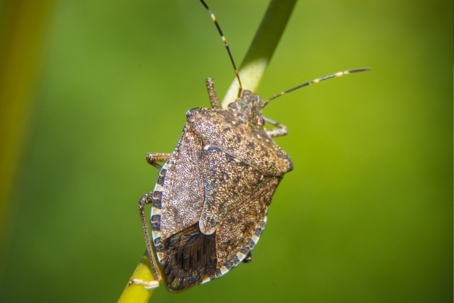Stink Bug Odor
The odor produced by stink bugs is primarily composed of a mixture of aldehydes and other chemicals. These compounds are secreted from specialized scent glands located on the underside of the stink bug's abdomen. When the stink bug feels threatened or is disturbed, it releases this odor as a defense mechanism to deter potential predators.
Are Stink Bugs Toxic?
The specific chemical composition of the stink bug's odor can vary slightly among different species of stink bugs, but it typically includes various aldehydes, such as:
- (E)-2-Decenal: This compound is a major contributor to the pungent, sweet, and slightly musty odor associated with stink bugs.
- (E)-2-Octenal: Another aldehyde that contributes to the odor and can have a citrusy or fruity note.
- (E)-2-Octen-1-ol: This compound can add a mushroom-like or earthy note to the odor.
In addition to these aldehydes, the odor may also contain trace amounts of other chemicals, which can give it its unique, unpleasant smell. The odor is intended to repel potential threats, and while it's not toxic to humans, it can be quite strong and offensive.
The specific composition of the odor may vary slightly from one stink bug species to another, but the aldehydes mentioned above are commonly found in the defensive secretions of many stink bug species.
Are Stink Bugs Poisonous?
Stink bugs are not considered poisonous to humans. These insects do possess a defense mechanism in the form of glands that produce a pungent and foul-smelling chemical. When threatened or disturbed, stink bugs release this odor as a deterrent to predators. While the odor can be unpleasant and irritating, it is not toxic or harmful to humans.
There are no known cases or reports of stink bug poisoning in humans. Stink bugs, while they can emit a foul-smelling odor as a defense mechanism when they feel threatened, are not poisonous to humans. The odor they produce is unpleasant but not toxic or harmful. In general, stink bugs are considered harmless to human health.
If you come into contact with a stink bug or are exposed to their defensive odor, you may experience temporary discomfort due to the unpleasant smell, but it is not a sign of poisoning. To minimize contact with stink bugs and their odor, it is advisable to use caution when handling them and to employ gentle methods for removing them from indoor spaces, such as using a glass and a piece of paper to carefully capture and release them outdoors.
Allergic Reactions To Stink Bugs
Allergic reactions to stink bug odors are extremely rare, but it is theoretically possible for someone to experience an allergic response to the compounds in the odor. If someone believes they have an allergy or sensitivity to stink bug odor, they should seek medical advice and evaluation from an allergist or medical professional. Common allergic reactions include skin rashes, hives, itching, sneezing, runny nose, or respiratory symptoms.
In such cases, an allergist can perform tests to determine the specific allergen responsible and develop an appropriate treatment plan. In most cases, avoiding exposure to the allergen is the primary preventive measure. For stink bug odor, this might involve taking steps to prevent stink bugs from entering the living space or using air purifiers to filter the air.
True allergies to stink bug odors are rare, and most people may simply find the odor unpleasant but do not experience allergic reactions. However, if someone has a genuine concern or experiences symptoms they suspect are related to stink bug odor exposure, consulting a healthcare professional is the best course of action for evaluation and guidance.

